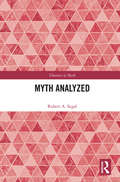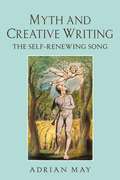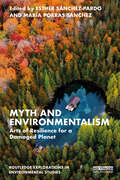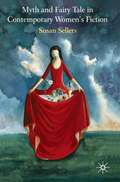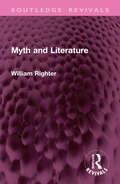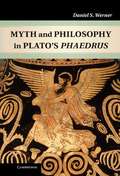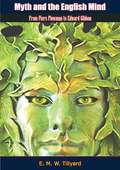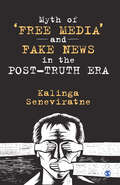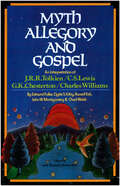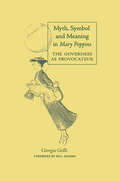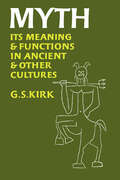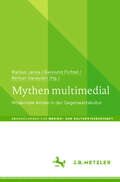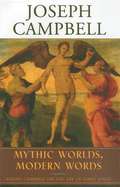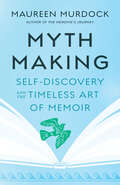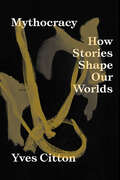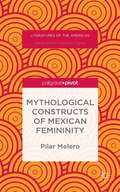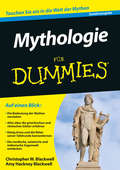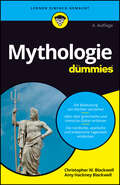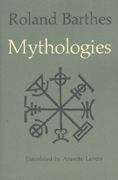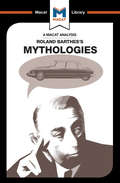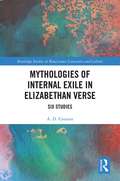- Table View
- List View
Myth Analyzed (Theorists of Myth)
by Robert A. SegalComparing and evaluating modern theories of myth, this book offers an overview of explanations of myth from the social sciences and the humanities. This ambitious collection of essays uses the viewpoints of a variety of disciplines - psychology, anthropology, sociology, politics, philosophy, religious studies, and literature. Each discipline advocates a generalization about the origin, the function, and the subject matter of myth. The subject is always not what makes any myth distinct but what makes all myths "myth". The book is divided into five sections, covering topics such as myth and psychoanalysis, hero myths, myth and science, myth and politics, and myth and the physical world. Chapters engage with an array of theorists--among them, Freud, Jung, Campbell, Rank, Winnicott, Tylor, Frazer, Malinowski, Levy-Bruhl, Levi-Strauss, Harrison, and Burkert. The book considers whether myth still plays a role in our lives is one of the issues considered, showing that myths arise anything but spontaneously. They are the result of a specific need, which varies from theory to theory. This is a fascinating survey by a leading voice in the study of myth. As such, it will be of much interest to scholars of myth and how it interacts with Sociology, Anthropology, Politics and Economics.
Myth and Creative Writing: The Self-Renewing Song
by Adrian MayMyth and Creative Writing is a unique and practical guide to the arts of creative writing. It:Gives a historical perspective on the storyteller's art Takes a wide view of myth, to include: legends, folklore, biblical myth, classical myth, belief myths, balladry and song. Considers all aspects of the creative process, from conception to completion Provides tips on seeking inspiration from classical and mythic sources Shows how myths can be linked to contemporary concerns Enables beginning writers to tap into the deeper resonances of myth Guides students to further critical and creative resourcesA secret that all writers know is that they are part of a long tradition of storytelling - whether they call it mythic, intertextual, interactive or original. And in the pantheon of storytelling, myths (those stories that tell us, in often magical terms, how the world and the creatures in it came to be) are the bedrock, a source of unending inspiration. One can dress the study of literature in the finest critical clothing - or intellectualise it until the cows come home - but at its heart it is nothing more - and nothing less - than the study of the human instinct to tell stories, to order the world into patterns we can more readily understand. Exploring the mythic nature of writing (by considering where the connections between instinct and art are made, and where the writer is also seen as a mythic adventurer) is a way of finding close links to what it is we demand from literature, which is - again - something to do with the essences of human nature. Further, in the course of examining the nature of myth, Adrian May provides a very practical guide to the aspiring writer - whether in a formal course or working alone - on how to write stories (myths) of their own, from how to begin, how to develop and how to close.
Myth and Environmentalism: Arts of Resilience for a Damaged Planet (Routledge Explorations in Environmental Studies)
by María Porras Sánchez Esther Sánchez-PardoThis volume traces the interconnections between myth, environmentalism, narrative, poetry, comics, and innovative artistic practice, using this as a framework through which to examine strategies for repairing our unhealthy relationship with the planet. Challenging late capitalist modes encouraging mindless consumption and the degradation of human–nature relations, this collection advocates a re-evaluation of the ethical relation to "living with" and sharing the Earth. Myth and the environment have shared a rich common cultural history travelling as far back as the times of storytelling and legend, with the environment often the central theme. Following a robust introduction, the book is organized into three main sections—Myth, Disaster, and Present-Day Views on Ecological Damage; Indigenous and Afro-diasporic Myths and Ecological Knowledge; Art Practices, Myth, and Environmental Resilience—and concludes with a Coda from Jeanette Hart-Mann. The methodology draws from diverse perspectives, such as ecocriticism, new materialism, and Anthropocene studies, offering a truly interdisciplinary discussion that reflects on the dialogue among environment and myth, and a broad range of contributions are included from Canada, the United States, the Caribbean, Ukraine, Japan, Morocco, and Brazil. The book joins a long line of approaches on the interrelations between ecological and mythical thinking and criticism that goes back to the early 20th century. This volume will be of interest to students, scholars, activists, and experts in environmental humanities, myth and myth criticism, literature and art on more-than human and nature interaction, ecocriticism, environmental activism, and climate change.
Myth and Fairy Tale in Contemporary Women’s Fiction
by Susan SellersWoman as gorgon, woman as temptress: the classical and biblical mythology which has dominated Western thinking defines women in a variety of patriarchally encoded roles. This study addresses the surprising persistence of mythical influence in contemporary fiction. Opening with the question 'what is myth?', the first section provides a wide-ranging review of mythography. It traces how myths have been perceived and interpreted by such commentators as Sigmund Freud, Carl Jung, Bruno Bettelheim, Roland Barthes, Jack Zipes and Marina Warner. This leads to an examination of the role that mythic narrative plays in social and self formation, drawing on the literary, feminist and psychoanalytic theories of Julia Kristeva, Luce Irigaray, Helene Cixous and Judith Butler to delineate the ways in which women's mythos can transcend the limitations of logos and give rise to potent new models for individual and cultural regeneration. In this light, Susan Sellers offers challenging new readings of a wide range of contemporary women's fiction, including works by A. S. Byatt, Angela Carter, Anne Rice, Michele Roberts, Emma Tennant and Fay Weldon. Topics explored include fairy tale as erotic fiction, new religious writing, vampires and gender-bending, mythic mothers, genre fiction, the still-persuasive paradigm of feminine beauty, and the radical potential of comedy.
Myth and Literature (Routledge Revivals)
by William RighterFirst published in 1975, Myth and Literature considers three points at which the concept of myth has entered modern literary imagination: the use of myth – or atleast their understanding of myth -- as a creative opening by modern writers, its exploration by critics as an interpretive device, and the analogy between certain ‘sense-making’ functions of ‘myth’, ‘fiction’ and literature itself. All three of these roles show the gradual movement from a point of precise demand to a diffuse and variable concept which is more pervasive because less distinct. The paradox of myth is shown to lie in its simultaneity of its corruption with the growth of its power over the modern literary mind. This book will be of interest to students of literature and history.
Myth and Philosophy in Plato'S Phaedrus
by Daniel S. Werner"Plato's dialogues frequently criticize traditional Greek myth, yet Plato also integrates myth with his writing. Daniel S. Werner confronts this paradox through an in-depth analysis of the Phaedrus, Plato's most mythical dialogue. Werner argues that the myths of the Phaedrus serve several complex functions: they bring nonphilosophers into the philosophical life; they offer a starting point for philosophical inquiry; they unify the dialogue as a literary and dramatic whole; they draw attention to the limits of language and the limits of knowledge; and they allow Plato to co-opt cultural authority as a way of defining and legitimating the practice of philosophy. Platonic myth, as a species of traditional tale, is thus both distinct from philosophical dialectic and similar to it. Ultimately, the most powerful effect of Platonic myth is the way in which it leads readers to participate in Plato's dialogues and to engage in a process of self-examination"--
Myth of ‘Free Media’ and Fake News in the Post-Truth Era
by Kalinga SeneviratneMyth of ‘Free Media’ and Fake News in the Post-truth Era reveals the story of ‘fake news’ hysteria and myth of ‘free media’ in the post-truth world order, starting from the question of whether there has really been a ‘truth’ era. The book examines how the news media is battling for relevance in the age of Internet. It shows how the wave of media ‘liberalization’ has weakened the basic premise of Libertarian Media Function Theory, which states that the media is the ‘Fourth Estate’ that protects the citizens from abuse of power by the government. It analyses how excessive commercialization of the media and the commodification of news has changed journalism globally. The book recommends a new paradigm and explains how it can be used to transform news reporting from an adversarial model to a human-centric one.
Myth, Allegory, and Gospel: An Interpretation of J.R.R. Tolkien, C.S. Lewis, G.K. Chesterton, Charles Williams
by John Warwick MontgomeryIf you are a "fan" of the fantasy books by Tolkien, C.S.Lewis, Charles Williams or Chesterton, then this is a book worth reading. It is a collection of essays by various authorities in literature, myth and theology. A couple of the contributors were acquainted with either Tolkien or Lewis. The central thesis running through this collection of essays is that mythic symbols found in folk-tales and religious rituals, all express a common, fundamental human yearning for healing and a return to a "lost paradise". The essayists draw on insights from religious phenomenology, Jungian analysis, Christian theology and literary interpretation to tease out the potent mythic symbols found in the writings of Tolkien, Lewis, Chesterton and Williams. Lewis, Williams and Tolkien were associated with one another as drinking partners in an informal literary club known as The Inklings. The essayists "test" their thesis about the power of myth to reveal our search for meaning through the novels of the Inklings. The essayists take us a step further to consider the Christian world-view that informed and shaped the writings of Tolkien, Lewis, Williams and Chesterton. Although a couple of the essays are slightly "dated", anyone interested in fantasy literature would find the thesis very absorbing. It should be useful not merely to students of English literature but also to the general reader who might like to know more about the backdrop to The Lord of the Rings, Narnia, etc. Certainly a book to add to your list for reading if you enjoyed the novels!
Myth, Ritual, and the Warrior in Roman and Indo-European Antiquity
by Roger D. WoodardThis book examines the figure of the returning warrior as depicted in the myths of several ancient and medieval Indo-European cultures. In these cultures, the returning warrior was often portrayed as a figure rendered dysfunctionally destructive or isolationist by the horrors of combat. This mythic portrayal of the returned warrior is consistent with modern studies of similar behavior among soldiers returning from war. Roger Woodard's research identifies a common origin of these myths in the ancestral proto-Indo-European culture, in which rites were enacted to enable warriors to reintegrate themselves as functional members of society. He also compares the Italic, Indo-Iranian, and Celtic mythic traditions surrounding the warrior, paying particular attention to Roman myth and ritual, notably to the etiologies and rites of the July festivals of the Poplifugia and Nonae Caprotinae, and to the October rites of the Sororium Tigillum.
Myth, Symbol, and Meaning in Mary Poppins: The Governess As Provocateur (Children's Literature and Culture #41)
by Giorgia GrilliThe Mary Poppins that many people know of today--a stern, but sweet, loveable, and reassuring British nanny--is a far cry from the character created by Pamela Lyndon Travers in the 1930's. Instead, this is the Mary Poppins reinvented by Disney in the eponymous movie. This book sheds light on the original Mary Poppins, Myth, Symbol, and Meaning in Mary Poppins is the only full-length study that covers all the Mary Poppins books, exposing just how subversive the pre-Disney Mary Poppins character truly was. Drawing important parallels between the character and the life of her creator, who worked as a governess herself, Grilli reveals the ways in which Mary Poppins came to unsettle the rigid and rigorous rules of Victorian and Edwardian society that most governesses embodied, taught, and passed on to their charges.
Myth, literature, and the creation of the topography of Thebes
by Daniel W. BermanHow does a city's legendary past affect its present? Thebes remains a city with one of the richest traditions of myth in all of Greece it was the home of Cadmus, Oedipus, and Hercules, and the traditional birthplace of Dionysus. The city's topography, both natural and built, very often plays a significant role in its myths. By focusing on Greek literature ranging from the oral epics to the travel writing of the Roman Empire, this book explores the relationship between the city's spaces as they were represented in the Greek literary tradition and the physical realities of a developing city that had been continuously inhabited since at least the second millennium BC. Spurred on especially by the city's catastrophic sack by Alexander the Great in 335 BC, the urban topography of Thebes came more and more to reflect the literary, even fictional, constructions of its mythic past. "
Myth: Its Meaning and Functions in Ancient and Other Cultures (Sather Classical Lectures #40)
by G. S. KirkThis book attempts to come to grips with a set of widely ranging but connected problems concerning myths: their relation to folktales on the one hand, to rituals on the other; the validity and scope of the structuralist theory of myth; the range of possible mythical functions; the effects of developed social institutions and literacy; the character and meaning of ancient Near-Eastern myths and their influence on Greece; the special forms taken by Greek myths and their involvement with rational modes of thought; the status of myths as expressions of the unconscious, as allied with dreams, as universal symbols, or as accidents of primarily narrative aims. Almost none of these problems has been convincingly handled, even in a provisional way, up to the present, and this failure has vitiated not only such few general discussions as exist of the nature, meanings and functions of myths but also, in many cases, the detailed assessment of individual myths of different cultures. The need for a coherent treatment of these and related problems, and one that is not concerned simply to propagate a particular universalistic theory, seems undeniable. How far the present book will satisfactorily fill such a need remains to be seen. At least it makes a beginning, even if in doing so it risks the criticism of being neither fish nor fowl. Sociologists and folklorists may find it, from their specialized viewpoints, a little simplistic in places; and a few classical colleagues will not forgive me for straying far beyond Greek myths, even though these can hardly be understood in isolation or solely in the light of studies in cult and ritual. Others may find it less easy than anthropologists, sociologists, historians of thought or students of French and English literature to accept the relevance of Levi-Strauss to some of these matters; but his theory contains the one important new idea in this field since Freud, it is complicated and largely untested, and it demands careful attention from anyone attempting a broad understanding of the subject. The beliefs of Freud and Jung, on the other hand, are a more familiar element in the situation and have given rise to an enormous secondary literature, much of it arbitrary and some of it absurd. The author has tried to isolate the crucial ideas and subject them to a pointed, if too brief, critique; so too with those of Ernst Cassirer.
Mythen multimedial: Modernste Antike in der Gegenwartskultur (Abhandlungen zur Medien- und Kulturwissenschaft)
by Markus Janka Raimund Fichtel Berkan SariaydinEtwa seit der Jahrtausendwende ist ein internationaler und nach wie vor anhaltender Boom von Adaptionen der griechisch-römischen Mythologie und Historie zu verzeichnen. Dieser ist durch eine bemerkenswerte mediale Vielfalt und Vernetzungsfreude gekennzeichnet. Folglich erstreckt sich die „modernste Antike“ unserer Zeit nicht nur auf hochliterarische Texte oder Neuinszenierungen antiker Dramen auf dem Theater, sondern entfaltet auch in gegenwärtigen Massenmedien vom Historienroman, dem Comic bis hin zum Hypermedium Themenpark und zum Alltagsmedium Internet seinen Wandlungsreichtum. Mithin scheint die Zeit der postmodernen Renaissance der Antike angebrochen zu sein. Die vielschichtigen Phänomene, die sich der altertumswissenschaftlichen Antikenrezeptionsforschung als Gegenstände bieten, sind mit dem Philosophen Hans Blumenberg (1920–1996) zu verstehen als Erscheinungsformen einer modernen Arbeit am Mythos. Als solche eröffnen sie Anschlussmöglichkeiten für neue Geschichten und Verfahrensmöglichkeiten zur ästhetischen und ethischen Auseinandersetzung mit den eigenen Grundfragen menschlichen Daseins im Spannungsfeld von Veralltäglichung und Entalltäglichung. Diese Forschungsaufgabe ist bislang in zahlreichen, teilweise weit verstreuten Einzeluntersuchungen angegangen worden. Oft handelt es sich um Fallstudien oder Ansätze zur Bündelung des reichen Materials. Dies hat zu einer erheblichen fachlichen und methodischen Heterogenität der Zugänge geführt. Dabei werden die sprach-, kulturraumspezifischen und medialen Unterschiede und Zusammenhänge in den Adaptionsstrategien allerdings oft nicht hinreichend reflektiert. Diese Lücke will dieser Band mit seiner synthetisierenden Anlage schließen. Er setzt sich zum Ziel, im Dialog der Fächer die als aussichtsreich erkannten Forschungsfelder vorzustellen. Innerhalb dieser Themenbereiche werden Untersuchungsdesigns für eine betont interdisziplinäre und intermediale Methodik erprobt. Diese streben eine systematische Zwischenbilanz der bisherigen Forschungserträge an und haben das Ziel, die bisherigen Ansätze synergetisch zu verweben. Der Band schafft eine Grundlage, um im Zusammenwirken der Disziplinen die Präsenz und die Bedeutung von Mythos und Historie der griechisch-römischen Antike in den europäischen Sprach- und Kulturräumen der Gegenwart punktgenau untersuchen und einordnen zu können.
Mythic Voices: Reflections in Mythology
by Celia Barker Lottridge Alison DickieMyths have been remembered and retold because they express things that are important to people. This book is a selective compilation of such myths from various parts of the world.
Mythic Worlds, Modern Worlds: On the Art of James Joyce
by Joseph CampbellMythic Worlds, Modern Words provides a representation of Campbell’s published writing, lectures on Joyce, and exchanges with his audiences, from his obituary notice on Joyce in 1941 to lectures delivered a few years before Campbell’s death.
Mythmaking: Self-Discovery and the Timeless Art of Memoir
by Maureen MurdockBest-selling Heroine&’s Journey author Maureen Murdock invites readers to explore their personal story within the rich tapestry of human experience by examining the craft of memoir alongside fresh writing advice and prompts.Maureen Murdock looks at thematic connections between ancient myths and contemporary memoirs to probe questions like: What is my journey? Where is home? Her background as a Jungian psychotherapist enriches her teaching—urging us to dig deep to identify our own universal archetypes.Writers who feel stuck or unworthy of writing about themselves will find thought-provoking inspiration and validation in this book, while those simply looking to use writing as a tool for self-exploration will examine their patterns and stories to reveal their true inner selves. And all will be left with a deeper understanding of the rich scope of the memoir genre by exploring contemporary favorites—like Terry Tempest Williams&’s Refuge, Joan Didion&’s The Year of Magical Thinking, and David Carr&’s The Night of the Gun—from a mythological perspective.Like myth, memoir reveals a unity to human experience that ultimately we all share similar hopes, dreams, and desires as well as fears, losses, and heartbreaks. Memoir helps writers understand the trajectory of their lives and helps readers better grasp our own place within the human experience.
Mythocracy: How Stories Shape Our Worlds
by Yves CittonHarnessing the power of storytelling for political progressMythocracy examines the narrative mechanisms that script our lives through the stories we tell one another. Digging beneath common anxieties about fake news, Yves Citton looks at the attention economy, which organises our political perceptions around affective attractors. These are much more powerful than the truth value of any given narrative. The time has come for the left to reclaim the power of myth from reactionary populism.
Mythological Constructs of Mexican Femininity
by Pilar MeleroLa Virgen de Guadalupe, la Malinche, la Llorona, and la Chingada reflect different myths of motherhood in Mexican culture. Mythological Constructs of Mexican Femininity explores the texts of Nellie Campobello, Juana Belen Gutierrez de Mendoza, Sara Estela Ramirez, and Andrea Villarreal Gonzalez to examine their use of motherhood as a political discursive position. Grounded on a postcolonial theoretical framework, and on the writings about womanhood and motherhood by Gabriela Mistral, Antonieta Rivas Mercado, Victoria Ocampo, and Rosario Castellanos, this book seeks to create a basis for the examination of non-canonical texts by Mexican women, but will also be useful in the examination of other marginal voices about femininity in Latin America and in Chicanx/Latinx studie. It also recognizes the value of analyzing writing through the ideas of Latin American female intellectuals who have theorized motherhood and womanhood and who know and understand the mythological constructs of (Latin American) feminisms. "
Mythologie für Dummies (Für Dummies)
by Christopher W. Blackwell Amy Hackney BlackwellAlles von Aphrodite bis Zarathustra Mythologie ist spannender als jeder Krimi, grausamer als jeder Horrorfilm und leidenschaftlicher als jeder Liebesroman. Aber wie hieß noch gleich der Meeresgott der Griechen? Was geschah bei der Götterdämmerung? Und wer gehörte zu König Artus‘ Tafelrunde? Antworten auf diese und viele weitere Fragen finden Sie in diesem Buch, das zum Schmökern einlädt und wunderbar als Nachschlagewerk dient. Neben der griechischen und römischen Mythologie erfahren Sie alles Wissenswerte zu den nordischen Sagen wie den Nibelungen und Beowulf, zu Mythen aus Ägypten und Asien sowie zu den Erzählungen der Inka, Maya und Azteken.
Mythologie für Dummies (Für Dummies)
by Christopher W. Blackwell Amy Hackney BlackwellMythologie ist spannender als jeder Krimi, grausamer als jeder Horrorfilm und leidenschaftlicher als jeder Liebesroman! Wie hieß er doch noch gleich, der Meeresgott bei den Griechen? Was waren bloß die zehn Aufgaben des Herkules? Antworten auf solch typische Fragen nach dem Motto "Wie war das nochmal?" finden Sie in diesem wunderbaren Nachschlagewerk, das zum Schmökern einlädt. Der Schwerpunkt des Buches liegt auf der griechischen und römischen Mythologie, aber auch nordeuropäische Gestalten wie König Artus und Beowulf, weniger bekannte Sagen aus Ägypten und Asien und die Mythen lateinamerikanischer Völker wie den Maya, Azteken und Inkas kommen nicht zu kurz.
Mythologies
by Roland Barthes Annette LayersThe following essays were written one each month for about two years, from 1954 to 1956, on topics suggested by current events. I was at the time trying to reflect regularly on some myths of French daily life. The media which prompted these reflections may well appear heterogeneous (a newspaper article, a photograph in a weekly, a film, a show, an exhibition), and their subject-matter very arbitrary: I was of course guided by my own current interests. The starting point of these reflections was usually a feeling of impatience at the sight of the 'naturalness' with which newspapers, art and common sense constantly dress up a reality which, even though it is the one we live in, is undoubtedly determined by history. In short, in the account given of our contemporary circumstances, I resented seeing Nature and History confused at every turn, and I wanted to track down, in the decorative display of what-goes-without-saying, the ideological abuse which, in my view, is hidden there.
Mythologies
by John GomezMythologies is a masterpiece of analysis and interpretation. At its heart, Barthes’s collection of essays about the “mythologies” of modern life treats everyday objects and ideas – from professional wrestling, to the Tour de France, to Greta Garbo’s face – as though they are silently putting forward arguments. Those arguments are for modernity itself, the way the world is, from its class structures, to its ideologies, to its customs. In Barthes’s view, the mythologies of the modern world all tend towards one aim: making us think that the way things are, the status quo, is how they should naturally be. For Barthes, this should not be taken for granted; instead, he suggests, it is a kind of mystification, preventing us from seeing things differently or believing they might be otherwise. His analyses do what all good analytical thinking does: he unpicks the features of the arguments silently presented by his subjects, reveals their (and our) implicit assumptions, and shows how they point us towards certain ideas and conclusions. Indeed, understanding Barthes’ methods of analysis means you might never see the world in the same way again. Six skills combine to make up our ability to think critically. Mythologies is an especially fine example of a work that uses the skills of analysis and creative thinking.
Mythologies of Internal Exile in Elizabethan Verse: Six Studies (Routledge Studies in Renaissance Literature and Culture)
by A.D. CousinsWriters of the English Renaissance, like their European contemporaries, frequently reflect on the phenomenon of exile—an experience that forces the individual to establish a new personal identity in an alien environment. Although there has been much commentary on this phenomenon as represented in English Renaissance literature, there has been nothing written at length about its counterpart, namely, internal exile: marginalization, or estrangement, within the homeland. This volume considers internal exile as a simultaneously twofold experience. It studies estrangement from one’s society and, correlatively, from one’s normative sense of self. In doing so, it focuses initially on the sonnet sequences by Sidney, Spenser, and Shakespeare (which is to say, the problematics of romance); then it examines the verse satires of Donne, Hall, and Marston (likewise, the problematics of anti-romance). This book argues that the authors of these major texts create mythologies—via the myths of (and accumulated mythographies about) Cupid, satyrs, and Proteus—through which to reflect on the doubleness of exile within one’s own community. These mythologies, at times accompanied by theologies, of alienation suggest that internal exile is a fluid and complex experience demanding multifarious reinterpretation of the incongruously expatriate self. The monograph thus establishes a new framework for understanding texts at once diverse yet central to the Elizabethan literary achievement.
Mythologies of the Prophet Muhammad in Early Modern English Culture
by Matthew DimmockThe figure of 'Mahomet' was widely known in early modern England. A grotesque version of the Prophet Muhammad, Mahomet was a product of vilification, caricature and misinformation placed at the centre of Christian conceptions of Islam. In Mythologies of the Prophet Muhammad in Early Modern English Culture Matthew Dimmock draws on an eclectic range of early modern sources – literary, historical, visual – to explore the nature and use of Mahomet in a period bounded by the beginnings of print and the early Enlightenment. This fabricated figure and his spurious biography were endlessly recycled, but also challenged and vindicated, and the tales the English told about him offer new perspectives on their sense of the world – its geographies and religions, near and far – and their place within it. This book explores the role played by Mahomet in the making of Englishness, and reflects on what this might reveal about England's present circumstances.
